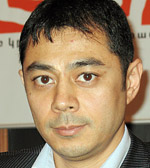Interview of the ABBYY Company’s Chairman of the Board of Directors David Yang to Mediamax Agency
Recently, in Armenia people have been talking actively about the necessity to develop science-intensive economy, involve the scientific potential, which successfully fulfills itself in different countries of the world, in the republic’s development. Mediamax correspondent asked David Yang, the Chairman of ABBYY Company’s Broad of Directors, to present his understanding of these processes.
David Yang was born in 1968 in Yerevan. In 1992, he graduated from the faculty of General and Applied Physics of Moscow Institute of Physics and Technology (MIPT). As a fourth-year student, David founded his first company – BIT Software, which was later on renamed into ABBYY. David Yung is one of the founders of Ayb Club and Educational Foundation, which plans to establish Ayb Learning Hub (ALH) in Yerevan.
– A lot of Armenian specialists, who deal with promising scientific activities, work abroad today. It is obvious that it is quite comfortable for them to live and work there. According to you, can one organize the process of attracting them to Armenia?
– What can Armenia offer scientists that the USA, Europe or Russia cannot? According to foreign scientists of Armenian origin, the most important thing Armenia can give is the student environment. Students and young scientists are people, whom they can pass their knowledge to; students, who will become a basis for revival of a strong academic scientific school. Many successful figures in science at a certain moment acquire a special attitude towards passing their knowledge to new generations. The very student atmosphere may serve as a point of attraction for compatriots, who would like to do something for Armenia. At the initial stage, there is the necessity of setting up educational-scientific laboratories under the best higher educational institutions. After that stage, in a few years, there will be people, who will manage to continue this process. And then investors and governmental financial means, necessary to equip more serious labs, will become available. Even if the government allocates millions of dollars for setting up advanced labs in Armenia today, who will work in those labs? I do not have much faith in the possibility to establish, using reasonable money, labs, which will provide the quality necessary to invite scientists only for scientific work. It is more realistic to attract scientists into especially set up educational-scientific laboratories and organize an “army” of young specialists around them. In particular, China has taken that path. China attracts scientific personnel not so much into laboratories, as into educational institutions and small scientific laboratories under those institutions. At the same time, one should realize that this process will not be easy either, since a higher school in Armenia needs serious reforms.
– What is your attitude towards the concept of “Armenian World”, within the framework of which they plan to turn not only residents of Armenia, but also the representatives of all Armenian nation, into consumers of intellectual and material production?
– I believe that successful implementation of this concept in many respects depends on concrete services and products, which will be offered to consumers. If we talk about the sphere of culture here, of course, one should produce products in the sphere of theatre, cinematography, music, literature, where the target audience represents ethnic Armenians. But if we talk about material production, everything that takes place in the world today, dictates a diametrically opposite approach: integration into the global market. In this view, Armenia should find points of growth for products, which will be consumed by not only Armenians, but also the entire world. If we want to make technology competitive, one should take competitive basis as foundation, be guided by the existing level in the world and create something new basing on it. Israel is a bright example for this. A country, which has small population, which exists in conditions of constant war, managed to become one of the world leaders in the sphere of bio- and information technologies in the course of 20 years. Another example is Finland. It is also a small country, with complex climatic conditions and with weakness of a part of the population for alcohol. Nevertheless, they set up wonderful industrial parks, the largest ones in Europe. One industrial park in Finland is larger than all industrial parks in Russia taken together. There is nothing impossible, one should simply study the best examples, chose an efficient strategy and thoroughly follow it. China is a gigantic country with gigantic population and with complex social situation. Nevertheless, China found the correct path of cooperation with its compatriots, working abroad, they started to return and what happens there now simply boggles minds. Another bright example is Taiwan. This is a small island without natural resources, 80% of the territories of which is covered by mountains. The population lives in conditions of full blockade by mainland China. Nevertheless, this country produces up to 60% of electronic components for the entire world. Thus, all this is already done in the world. One should set up a workgroup with participation of scientists, industrialists and patrons, who will study the practice of the above-mentioned countries: the necessary steps to attract investment capital, basing on which schools and higher educational institutions start to grow. Given the entrepreneurship talent Armenia possesses, given the creative mind of the people living hear, this is absolutely possible. Will, desire and thought-out governmental policy, headed by people, who enjoy trust of investors, are necessary. And then investment funds in Armenia will be established not only by people with Armenian origin. Residents of Armenia need full realization of the fact that success, both personal and the success of the country in general, depend only on them.

